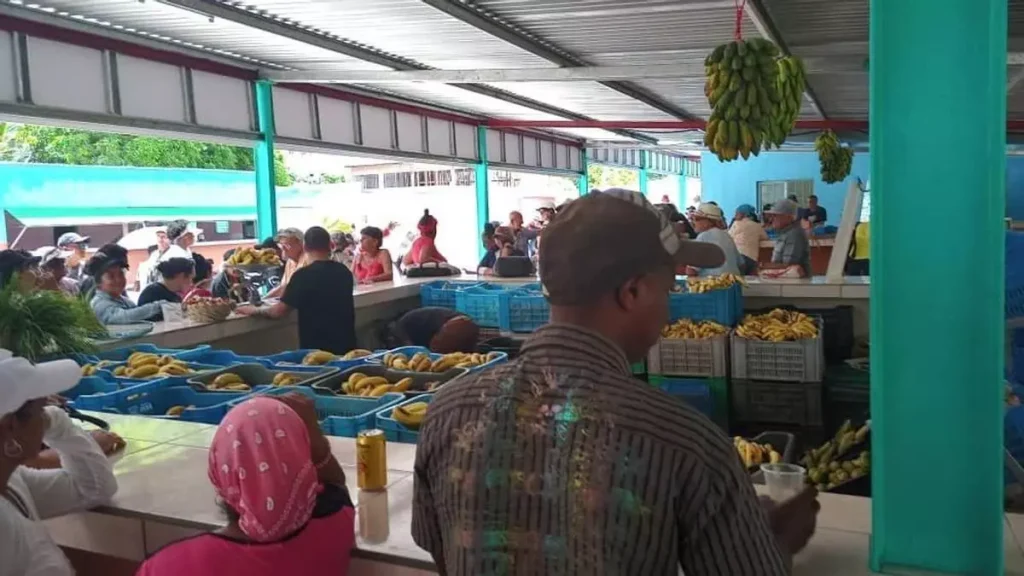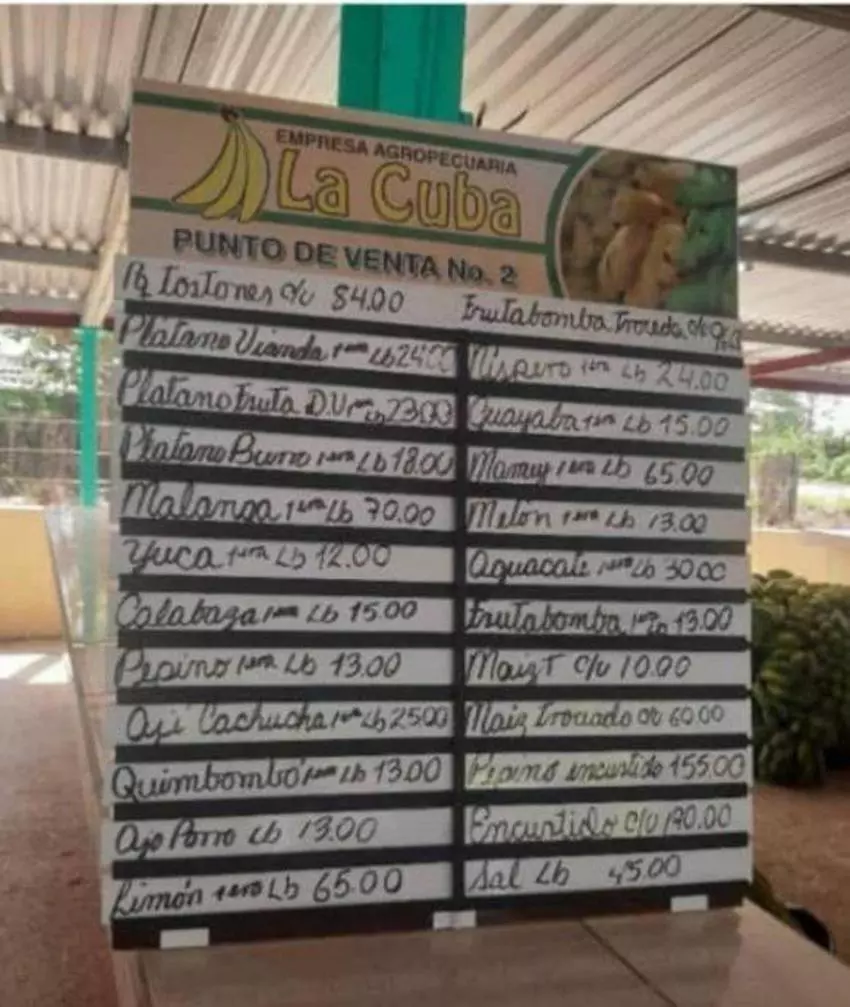
![]() 14ymedio, Havana, July 27, 2025 — In a country where a trip to the farmers market is a game of Russian roulette, a place with more emotion than food, where the price board is often left blank, a phenomenon that defies Cuban logic has emerged: a state-run produce market with stable supplies, no middle-men and reasonable prices. At least that’s how state media describes La Cuba, a produce market in Ciego de Ávila that is one of the few agricultural companies in the country that still produces food.
14ymedio, Havana, July 27, 2025 — In a country where a trip to the farmers market is a game of Russian roulette, a place with more emotion than food, where the price board is often left blank, a phenomenon that defies Cuban logic has emerged: a state-run produce market with stable supplies, no middle-men and reasonable prices. At least that’s how state media describes La Cuba, a produce market in Ciego de Ávila that is one of the few agricultural companies in the country that still produces food.
The fact that the province is once again hosting the annual 26th of July celebrations has been a godsend for La Cuba, a standout among the many ruined “production centers.” Battered by the country’s ongoing economic crisis, the company has been trying to recover for a year and the government’s attention in recent months has been helping it achieve that goal.
All the collective had to do was declare that it wanted to surpass its plantain production record by planting 2,800 hectares of their principle crop by July 26, with that number increasing to nearly 3,000 hectares by August 30, Fidel Castro’s birthday. A year ago, they were happy to have planted 300 hectares.
The business has been profitable. Not only is La Cuba is producing, it is diversifying. It also grows corn, cassava, beans, malanga, tomatoes, sesame, sunflowers, sweet potatoes, cucumbers and melons. Its workforce has grown to 1,570 employees, more than double the mere 600 it had a year ago. In return, the government has a successful company it can boast about.
While the rest of the country is grappling with empty farms and prices on par with those of New York, La Cuba has even opened a retail market — also to commemorate July 26th — promising, in addition to food, no scalpers, no mystery and affordable prices. After the opening and the publication of a photo showing the price board, the public was quick to react. Some even thought it was, according to Cubadebate, “staged” and found it “insulting.”

“It seems like fake news but it isn’t. It is La Cuba, the exception that proves the rule until it becomes the rule and not the exception,” a state-media article pointed out, fully aware that La Cuba is a rare bird.
A month ago, the TV interview program Mesa Redonda (Roundtable) dedicated an entire episode to the company and its director, Ariel Nieves Concepción, who was congratulated on his achievements. These include 1,000 boxes of bananas per day, a closed production cycle and a level of diversification that allows the company to supply not only its new produce market but also to fulfill government contracts.
Workers’ wages have also improved. “Those directly involved in production earn between 20,000 and 30,000 pesos [a month], which allows them to purchase products more easily. Furthermore, when harvests are good, their income will be even better,” he said.
These results, however, have not come easy. In its current situation, with every sector of the economy in crisis, the Cuban government is far from being able to guarantee the company the resources it needs to maintain production. This is especially true when it comes to fertilizers and fuel, two essential supplies that are not widely available in the country.
The company has had to bite the bullet and find its own ways to ward off insects. “The use of biological solutions at the company is no longer an option due to a shortage of chemicals. It has now become a business strategy,” explained a technical specialist on Mesa Redonda, adding that they have been able to increase production by turning to organic pesticides.
The company has had to bite the bullet and find its own ways to ward off insects
As for fuel, which depends solely on government allotment, the story is different. Company executives must resign themselves to whatever they get. “Everyone is always working hard to get the job done but, without fuel, you have to prioritize a lot,” said one of them.
Clearing land covered with marabou and other weeds has been another daunting task for La Cuba, which barely had enough workers a few months ago. Televisión Cubana reported that some areas have not been planted for 10 to 15 years.
The company also had to address the poverty faced by many of its workers, for whom it has begun building housing. “Shelter is essential. It’s not easy to come home from work and not have a place to rest,” said one of the interviewees. “We are also planning to build homes for workers, to sell roofing material at affordable prices and to create small public plazas within communities.”
State officials as well company directors both know that La Cuba is a special case, not only because of its favorable location and fertile fields but also because of the special attention it receives from the Cuban government. No other company would be able to stay afloat while paying salaries of thousands of pesos a month while selling its bananas for 24 pesos a pound. It is clear that officials are not telling the truth and that the alleged success of this state-owned company is likely due to hidden subsidies.
Nevertheless, government officials argue that the company’s accomplishments are the result of good management. They believe La Cuba should can serve as an example for the rest of the agricultural sector, for which moving crops from farm to table without food evaporating in the process seems like an impossible task.
____________
COLLABORATE WITH OUR WORK: The 14ymedio team is committed to practicing serious journalism that reflects Cuba’s reality in all its depth. Thank you for joining us on this long journey. We invite you to continue supporting us by becoming a member of 14ymedio now. Together we can continue transforming journalism in Cuba.
